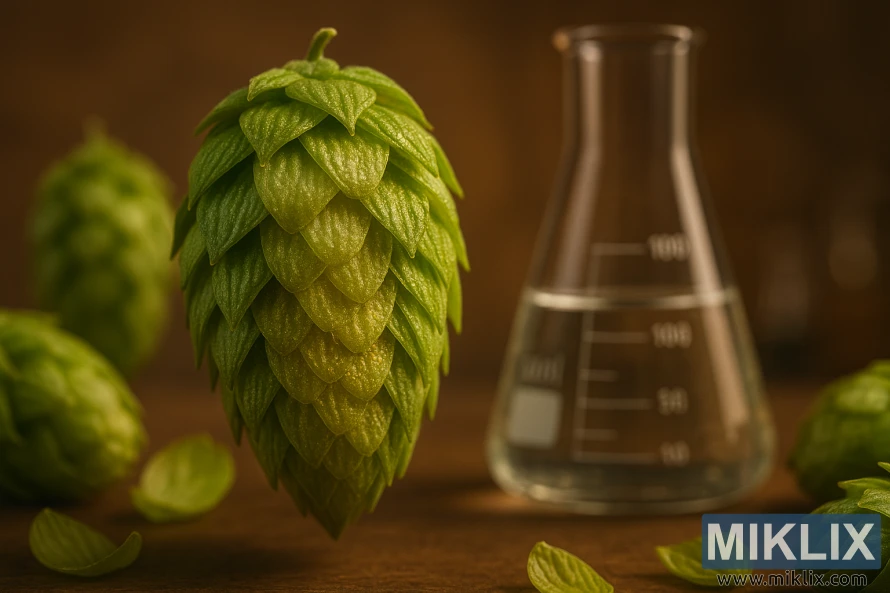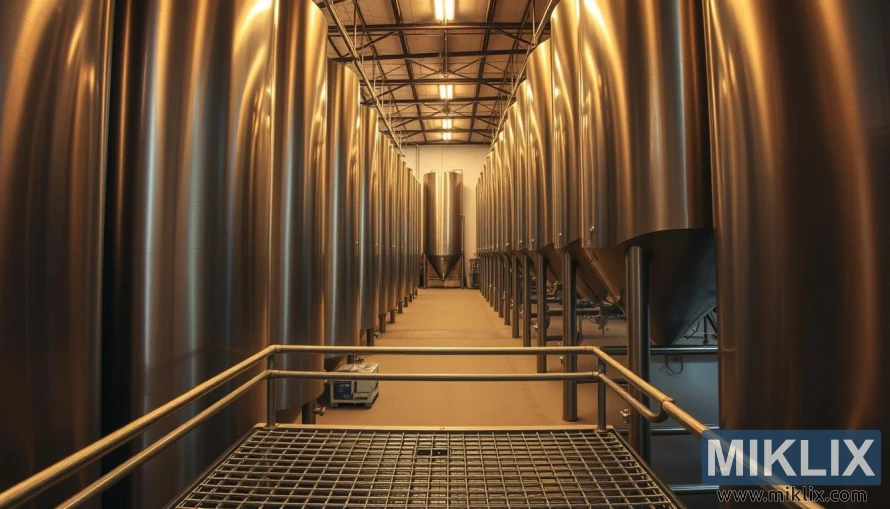Hops in Beer Brewing: Apollo
Published: July 19, 2025 at 8:58:26 PM UTC
Beer brewing is an art that demands precision and the right ingredients. Among the various hop varieties, Apollo Hops stand out. They are known for their strong bitterness and unique flavor profile. These hops are favored by craft beer enthusiasts for their high alpha acid content. They bring bold, floral notes and robust bitterness to beers. This makes them an excellent choice for brewers aiming to create complex, full-bodied brews. The importance of these hops in beer brewing cannot be overstated. They significantly contribute to the beer's overall character.

Key Takeaways
- Apollo Hops are known for their high alpha acid content and unique flavor profile.
- They are a popular choice among craft beer enthusiasts for their bold flavors.
- These hops contribute to the complexity and full-bodied nature of beers.
- Beer brewing with Apollo Hops requires precision to achieve the desired flavor.
- The use of Apollo Hops can elevate the overall character of a beer.
Introduction to Apollo Hops
In the United States, Apollo Hops have quickly become a favorite among craft brewers. Introduced in 2006 by the Hopsteiner Breeding Program, they are known for their high-quality. This program is renowned for developing top-notch hop varieties.
Apollo Hops are a result of crossbreeding Zeus hops with other USDA varieties. This process has created a powerful, dual-purpose hop. It is high in alpha acids, making it perfect for both bittering and adding flavor/aroma.
The unique traits of Apollo Hops make them ideal for brewers aiming to craft complex, full-bodied beers. Their high alpha acid content and distinct flavor profile give brewers the freedom to experiment with various beer styles.
As a relatively new hop variety, Apollo Hops are continually being explored by brewers. Their vast possibilities for creating unique and complex beers are expected to make them even more popular in the brewing community.
The Distinctive Profile of Apollo Hops
Apollo hops are renowned in the brewing world for their bold bitterness and rich aroma. They offer a strong, resinous taste with earthy undertones. This is complemented by subtle citrus, grapefruit, and pine notes, creating a complex flavor profile. This makes them a standout choice for a variety of beer styles.
The flavor profile of Apollo hops is both complex and well-balanced. Their bitterness is pronounced but not overwhelming, serving as a solid base for many beer recipes. The aroma is a unique blend of floral and fruity, elevating the beer's overall character.
Brewers seeking to craft complex, full-bodied beers find Apollo hops highly appealing. Their high alpha acid content and distinct flavor profile enrich the brewing process. This allows for the creation of diverse beer styles that satisfy different tastes and preferences.
Adding Apollo hops to a brew significantly enhances the beer's flavor and aroma. Their resinous and earthy flavors add depth, while citrus and fruity notes introduce a refreshing contrast. This versatility makes Apollo hops an ideal choice for brewers aiming to create beers with a unique character.
Chemical Composition and Alpha Acid Content
Understanding the chemical makeup of Apollo Hops is key to unlocking their full brewing capabilities. These hops boast a high alpha acid content, ranging from 15% to 19%, and a beta acid content of 6.8%. These compounds are vital in beer brewing, adding to the beer's bitterness, flavor, and overall character.
Alpha acids are essential for beer bitterness. With a high alpha acid content, Apollo Hops are perfect for brewers aiming to craft complex, full-bodied beers. The bitterness they introduce helps balance the sweetness of malt, creating a well-rounded flavor.
Beta acids, while less direct in their role, also play a part in beer's flavor and aroma. The blend of alpha and beta acids in Apollo Hops offers brewers a versatile ingredient for a wide range of beer styles.
The importance of alpha acid content in Apollo Hops cannot be overstated. It significantly influences the beer's bitterness and overall character. Brewers can use Apollo Hops to achieve a robust bitterness that enhances their recipes.
- Alpha acid content: 15-19%
- Beta acid content: 6.8%
Aroma and Flavor Contributions
Apollo Hops introduce a bold and complex flavor profile to beer, enriching its character. Their unique flavor profile is both complex and balanced. It features a strong, assertive bitterness and a distinct aroma that combines floral and fruity notes.
The aroma of Apollo Hops significantly adds to the beer's complexity. They bring a floral and fruity scent, which complements the malt and enhances the hop character.
In terms of flavor, Apollo Hops offer a robust and assertive bitterness that is well-balanced. This makes them perfect for brewers aiming to craft complex, full-bodied beers. The flavor profile is complex, featuring floral and fruity notes that mirror the aroma.
The main characteristics of Apollo Hops' aroma and flavor contributions are:
- Floral and fruity aroma
- Robust and assertive bitterness
- Complex flavor profile with floral and fruity notes
- Enhances the overall character of beer
By using Apollo Hops in their brews, brewers can achieve a balanced and complex flavor profile. This appeals to a wide range of beer enthusiasts.
Best Beer Styles for Apollo Hops
Apollo Hops are a versatile ingredient, excelling in American-style IPAs and pale ales. They bring a unique flavor to these beer styles.
Known for their bold, floral notes and robust bitterness, Apollo Hops are ideal for brewers aiming to craft complex, full-bodied beers. Their high alpha acid content contributes a distinctive bitterness, balancing the sweetness of malt-forward brews.
- American-style IPAs, where their robust bitterness and floral notes can enhance the hoppy flavor profile.
- Pale ales, where Apollo Hops can add a balanced bitterness and a touch of floral character.
- Double IPAs, where the bold, citrusy notes of Apollo Hops can complement the complex malt profile.
By understanding the characteristics of Apollo Hops and how they interact with different beer styles, brewers can unlock new possibilities for creating unique and delicious beers.
Brewing Techniques with Apollo Hops
Apollo Hops provide brewers with a versatile ingredient for crafting unique beers. Their high alpha acid content and distinctive flavor profile make them ideal for various brewing techniques. This versatility allows brewers to achieve a range of effects in their beers.
One key use of Apollo Hops is as a bittering hop. Added early in the boil, they contribute a robust bitterness that complements the malt sweetness in beer. The alpha acids in Apollo Hops make them highly effective for this purpose.
Apollo Hops can also be used as a flavor or aroma hop. When added later in the boil or during whirlpooling, they impart complex flavors and aromas. These additions enhance the beer's overall character.
- Early boil additions for bitterness
- Late boil additions for flavor
- Whirlpool or dry hopping for aroma
When brewing with Apollo Hops, timing is key. The boil time affects the extraction of alpha acids and the preservation of delicate flavor and aroma compounds. This timing is critical for achieving the desired beer characteristics.
- Determine the desired effect (bitterness, flavor, aroma)
- Choose the appropriate boil time or hopping technique
- Adjust quantities based on the beer's specific gravity and style guidelines
By mastering the use of Apollo Hops in different brewing techniques, brewers can create a wide range of beer styles. From bold IPAs to complex lagers, experimentation with hop additions and boil times allows brewers to fine-tune their recipes. This fine-tuning helps achieve the desired balance of flavors.

Optimal Timing for Apollo Hop Additions
To fully harness the power of Apollo hops, brewers must meticulously plan their additions. The best time for adding Apollo hops varies based on brewing methods and the flavor profile desired.
Apollo hops stand out for their high alpha acid content, making them perfect for bittering. They are usually added at the start of the boil. This allows their alpha acids to isomerize, adding to the beer's bitterness.
For flavor and aroma, the timing of Apollo hop additions can differ. Adding them in the late boil (15-20 minutes before the end) can introduce complex flavors. Dry hopping with Apollo hops can further enhance the beer's aroma.
- Early boil additions for bittering
- Late boil additions for flavor
- Dry hopping for aroma enhancement
The timing of Apollo hop additions also depends on the beer style. For example, in hop-forward styles like IPAs, Apollo hops are used generously for both bittering and flavor/aroma.
Choosing the right timing for Apollo hop additions is about finding a balance. It's about achieving the right bitterness, flavor, and aroma. By understanding Apollo hops and experimenting with different times, brewers can create beers that highlight these hops' unique qualities.
Substitutes and Complementary Hop Varieties
Understanding substitutes and complementary hop varieties is key when brewing with Apollo Hops. These hops are prized for their high alpha-acid content and distinct flavor. Brewers may seek to substitute or complement them with other varieties to achieve their desired taste.
For those looking for substitutes, high-alpha hop varieties like Magnum or Columbus can fill the gap. These hops match Apollo Hops in bittering capability and can be used in similar amounts. Some notable substitutes include:
- Magnum Hops: Known for their clean bitterness and high alpha-acid content.
- Columbus Hops: Offers a robust flavor profile with notes of citrus and earthy undertones.
- Tomahawk Hops: Provides a strong bitterness and a flavor profile that includes notes of pine and spice.
Complementary hop varieties can also be used to enhance or alter the flavor profile of beers brewed with Apollo Hops. For instance, pairing Apollo Hops with citrus or floral hops can add complexity to the beer.
By grasping the characteristics of Apollo Hops and their substitutes or complements, brewers can explore new recipes and flavor profiles. This experimentation can significantly enhance their brewing skills.
Storage and Handling Requirements
To preserve the distinctive characteristics of Apollo Hops, brewers must adhere to specific storage and handling practices. Apollo Hops are known for their high alpha acid content and unique flavor profile. Proper storage and handling are critical for maintaining their quality.
Storage conditions significantly impact the quality of Apollo Hops. It's recommended to store them in a cool, dry environment, away from direct sunlight and heat sources. The ideal storage temperature is below freezing, typically around 0°F (-18°C). This slows down the degradation of alpha acids and essential oils.

Handling practices are equally important. Apollo Hops should be handled to minimize exposure to air, moisture, and light. When not in use, hop bales or packages should be resealed tightly. This prevents oxidation and contamination.
Here are some key storage and handling tips for Apollo Hops:
- Store Apollo Hops in a cool, dry place, away from direct sunlight.
- Maintain a storage temperature below freezing (0°F or -18°C).
- Minimize exposure to air and moisture by resealing hop packages tightly.
- Use airtight containers to store hop bales or packages when not in use.
By following these storage and handling guidelines, brewers can ensure that their Apollo Hops retain their potency and flavor characteristics. This ultimately contributes to the production of high-quality beers.
Common Brewing Challenges and Solutions
Apollo Hops present unique brewing challenges that, when addressed, can lead to the creation of complex, full-bodied beers. Achieving the optimal flavor profile is a primary challenge brewers face when using Apollo Hops. These hops are known for their high alpha acid content and distinctive aroma, which can be both an asset and a challenge.
To overcome these challenges, brewers must carefully consider their brewing techniques and hop addition timing. For instance, Apollo Hops can be prone to "hop creep," a phenomenon where the hops continue to contribute to the beer's bitterness and flavor over time. This can lead to over-bitterness if not managed properly.
Several strategies can help mitigate these issues. First, brewers should be mindful of the alpha acid content in Apollo Hops and adjust their hop additions. This might involve reducing the amount of hops used or adjusting the timing of hop additions to achieve the desired bitterness and flavor profile.
Another key consideration is the storage and handling of Apollo Hops. Proper storage in a cool, dry environment can help preserve the hops' potency and flavor. Using techniques such as hop bursting or late hop additions can also help to minimize the risk of over-bitterness and maximize the aromatic contributions of the hops.
- Monitor alpha acid content and adjust hop additions correspondingly.
- Use proper storage and handling techniques to preserve hop quality.
- Employ brewing techniques like hop bursting or late hop additions to manage flavor and bitterness.
By understanding and addressing these common brewing challenges, brewers can unlock the full potential of Apollo Hops. This allows for the creation of beers that are both complex and full-bodied. With the right techniques and knowledge, the unique characteristics of Apollo Hops can be leveraged to produce a wide range of beer styles, from IPAs to stouts.
Commercial Brewing Applications
Commercial brewers choose Apollo Hops for their strong bitterness and unique flavor. Their high alpha acid content makes them perfect for complex, full-bodied beers. These beers can stand out in the market.
Apollo Hops are versatile, fitting into many beer styles. Here are some key uses:
- Adding bitterness to pale ales and IPAs
- Enhancing the flavor of stouts and porters
- Creating unique blends for craft beers
In commercial brewing, hop timing is critical. Apollo Hops can be added at different stages for various effects. For bitterness, they're added during the boil. For flavor and aroma, they're added towards the end or during dry-hopping.
The advantages of using Apollo Hops include:
- High alpha acid content for robust bitterness
- Unique flavor adds complexity to beers
- They're versatile for many beer styles
By using Apollo Hops, commercial brewers can craft distinctive beers. These beers appeal to a broad audience.
Pairing Apollo Hops with Other Ingredients
The unique profile of Apollo hops makes them an ideal candidate for pairing with a range of brewing ingredients. Apollo hops are known for their high alpha acid content and distinctive flavor profile. This makes them a versatile choice for brewers aiming to craft complex, full-bodied beers.
When pairing Apollo hops with other ingredients, brewers can create a variety of unique flavor profiles. For instance, combining Apollo hops with citrus-forward hops like Citra or Simcoe can add a bright, zesty character to beers. On the other hand, pairing Apollo with earthy hops like Fuggles or East Kent Goldings can enhance the beer's depth and complexity.
Apollo hops can also be paired with various malts to achieve different effects. For example, using Apollo hops with pale malts can result in a crisp, refreshing beer. Pairing them with darker malts can produce a richer, more robust flavor.
In addition to hops and malts, brewers can experiment with pairing Apollo hops with other ingredients like fruits, spices, or herbs to create truly unique beers. The key is to balance the flavors so that the Apollo hops complement the other ingredients without overpowering them.
- Experiment with different hop combinations to find the perfect blend for your beer style.
- Consider the alpha acid content of Apollo hops when pairing them with other hops to achieve the desired bitterness level.
- Don't be afraid to try pairing Apollo hops with unconventional ingredients to create innovative beers.
By understanding how to effectively pair Apollo hops with other ingredients, brewers can unlock a world of creative possibilities in their brewing endeavors.

Recipe Development Guidelines
To fully harness Apollo Hops, brewers must consider the hop's inherent qualities and the brewing techniques used. Apollo Hops are known for their distinctive profile. This can add complexity and depth to various beer styles.
When developing recipes with Apollo Hops, balancing their unique flavor and aroma with other ingredients is key. This involves selecting malts that complement the hop's characteristics. Determining the optimal timing for hop additions is also critical.
Apollo Hops have a distinct alpha acid content and aroma profile. These characteristics can significantly impact a beer's final character. Understanding these is essential for creating balanced and complex beers.
To effectively incorporate Apollo Hops into a recipe, brewers should consider the following guidelines:
- Balance Flavor and Aroma: Ensure that the hop's contributions are balanced with the malt and other ingredients.
- Optimize Hop Additions: Determine the best times for adding Apollo Hops during the brewing process to achieve the desired flavor and aroma.
- Select Complementary Ingredients: Choose malts and other ingredients that complement the characteristics of Apollo Hops.
By following these guidelines and understanding Apollo Hops' unique qualities, brewers can create innovative and delicious beers. These beers showcase the versatility of this hop variety.
Quality Control and Testing Methods
To ensure the excellence of Apollo hops, rigorous quality control and testing are essential. Apollo hops are renowned for their high alpha acid content and unique flavor profile. This makes them a popular choice among brewers. Ensuring the quality and consistency of these hops is critical for producing high-quality beers.
Quality control for Apollo hops involves several key steps. First, it's essential to source hops from reputable suppliers who adhere to strict cultivation and harvesting practices. This ensures that the hops are free from contaminants and have the desired chemical composition.
Testing methods for Apollo hops include evaluating their alpha acid content, beta acid content, and hop storage index. These tests help brewers understand the bittering and flavor profile of the hops. Regular testing also enables brewers to detect any variations in hop quality, allowing for adjustments in their brewing recipes.
The key testing methods for Apollo hops are:
- Alpha acid content analysis to determine bittering
- Beta acid content analysis for flavor and aroma characteristics
- Hop storage index testing to assess stability and shelf life
By implementing these quality control and testing methods, brewers can ensure that their Apollo hops meet the highest standards. This not only enhances the quality of their beers but also contributes to consistency across batches. Whether you're brewing a hoppy IPA or a complex lager, the quality of your Apollo hops is key.
In summary, quality control and testing methods are vital components in the brewing process when using Apollo hops. By sourcing high-quality hops and conducting regular testing, brewers can achieve the desired flavor profiles and bitterness levels in their beers.
Conclusion
Mastering Apollo hops demands a deep grasp of their distinct flavor profile, brewing methods, and quality standards. Their high alpha acid content makes them perfect for brewers aiming to craft complex, full-bodied beers.
By adhering to the guidelines in this article, brewers can effectively use Apollo Hops to boost their beer's flavor and aroma. The essence of mastering Apollo Hops is understanding their chemical makeup and how they interact with other brewing ingredients.
In your brewery, experimenting with various brewing techniques and recipes is key to unlocking Apollo Hops' full range. As you hone your approach, you'll be able to produce a diverse array of beers that highlight the unique traits of this versatile hop variety.
Further Reading
If you enjoyed this post, you may also like these suggestions:
